|
|
|
Sort Order |
|
|
|
Items / Page
|
|
|
|
|
|
|
| Srl | Item |
| 1 |
ID:
030878
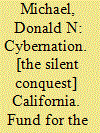

|
|
|
|
|
| Publication |
California, Fund for the Republic, Inc, 1962.
|
| Description |
47p
|
|
|
|
|
|
|
|
|
|
|
|
Copies: C:1/I:0,R:0,Q:0
Circulation
| Accession# | Call# | Current Location | Status | Policy | Location |
| 005472 | 003.5/MIC 005472 | Main | On Shelf | General | |
|
|
|
|
| 2 |
ID:
042784
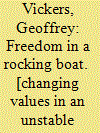

|
|
|
|
|
| Publication |
London, Allen Lane the Penguin press, 1970.
|
| Description |
215p.
|
| Standard Number |
0713901462
|
|
|
|
|
|
|
|
|
|
|
|
Copies: C:1/I:0,R:0,Q:0
Circulation
| Accession# | Call# | Current Location | Status | Policy | Location |
| 005805 | 306.46/VIC 005805 | Main | On Shelf | General | |
|
|
|
|
| 3 |
ID:
122298
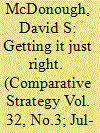

|
|
|
|
|
| Publication |
2013.
|
| Summary/Abstract |
Strategic culture provides a good starting point to explain Canada's goldilocks grand strategy. But it also has important theoretical shortcomings. This article offers an important reconceptualization of strategic culture. It synthesizes the insight from strategic culture and cybernetic theory to better account for Canadian strategic behavior. It introduces the notion of standing operational doctrines-continental soft-bandwagoning and defensive weak-multilateralism-through which Canada's strategic cultural beliefs, attitudes, and inclinations are standardized and regularized. This theoretical synthesis provides strategic culture with greater specificity, better use as a causal explanation, and can be potentially applied to other cases.
|
|
|
|
|
|
|
|
|
|
|
|
|
|
|
|
| 4 |
ID:
182840
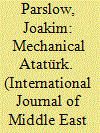

|
|
|
|
|
| Summary/Abstract |
Turkey's 1960 military coup d’état was received by Kemalists in the courts, bureaucracy, and universities as an opportunity to reinvigorate Atatürk's ideal of a centralized and rationally organized state. This article investigates how a handful of avant-garde thinkers sought to ride the post-1960 wave of reformism by promoting a techno-utopian approach to governance through publications and seminars aimed at state leaders and intellectuals. Cybernetics, they argued, offered a paradigm of adjudication and administration unblemished by association with the ascendant ideologies of the Cold War, whether socialist or conservative, and was fully in keeping with Kemalism. I argue that, although it remained largely at the stage of fantasy, Turkish cybernetics ultimately served as a set of metaphors with which conservative state thinkers from different political camps found common ground, facilitating the shift that occurred within the state during the 1970s away from the rights-based pluralism of the Constitution of 1961 and toward an effort to de-radicalize Turkish society, if necessary through violence.
|
|
|
|
|
|
|
|
|
|
|
|
|
|
|
|
| 5 |
ID:
027902
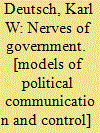

|
|
|
|
|
| Publication |
New York, Free Press, 1966.
|
| Description |
xxxvi, 316p.
|
|
|
|
|
|
|
|
|
|
|
|
Copies: C:1/I:0,R:0,Q:0
Circulation
| Accession# | Call# | Current Location | Status | Policy | Location |
| 010766 | 003.5/DEU 010766 | Main | On Shelf | General | |
|
|
|
|
| 6 |
ID:
183422
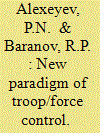

|
|
|
|
|
| Summary/Abstract |
This paper cites conclusions from the results of philosophical-methodological analysis of progress in the ideas of troop/ force control. It describes the theoretical foundations of defining the new paradigm (key idea) of troop/force control and its likely development trends.
|
|
|
|
|
|
|
|
|
|
|
|
|
|
|
|
| 7 |
ID:
105953
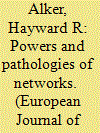

|
|
|
|
|
| Publication |
2011.
|
| Summary/Abstract |
This article reconstructs Karl Deutsch's fearful yet hopeful views about the powers and
pathologies of military, and other, national and international network systems. These
views presuppose Norbert Wiener's Cybernetic Interpretive Hypothesis: that 'society
can only be understood through a study of the messages and communication facilities
which belong to it'; that the societal trend is towards more computerized communication
systems; and that they embody an 'open vs. closed' living systems ethos. Drawing on
science and technology studies by Edwards and Mirowski, the author suggests how
Deutsch's and Wiener's prophetic hopes, fears, and insights can also enrich and redefine
contemporary debates about the historical-technological development of our national
societies, the powers and pathologies of game-theoretically programmed computer
networks, the assessment of the life-preserving potential of our partly automated
security systems, the major threats from the continued poverty of the less developed
world, problems of decentralized governance, and the political, ethical, and religious
justifications for our national, international, and civilizational identities and purposes.
|
|
|
|
|
|
|
|
|
|
|
|
|
|
|
|
|
|
|
|
|